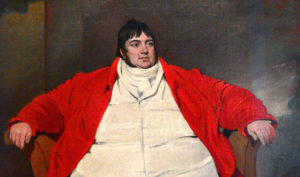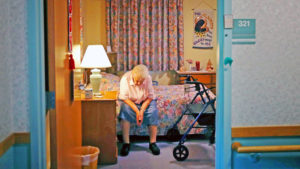The backlash against The Whale seems to have taken Darren Aronofsky, its director, by surprise. The film concerns a gay online English instructor named Charlie who is dying from congestive heart failure, an ailment hardly unrelated to his weight of 600 pounds. Brendan Fraser’s remarkably convincing fat suit has aggrieved fat activists, presumably because all those 600-pound out-of-work actors should have been approached for the part first. (Aronofsky did indeed make a stab at finding an actor who wouldn’t have required such elaborate makeup, but he soon gave up and decided, like an actual film director, to pick the candidate who could best perform the role.) The film has also been decried as “fat-phobic”, as it portrays the experience of weighing about as much as a Mini Cooper as disagreeable. Aronofsky is dismayed, for he created this work in a spirit of intense sympathy, by which his detractors appear unmoved.
I was moved. By the end, I teared up, though I couldn’t discern whether my sorrow was solely a tribute to the artistry of the film. My older brother also staggered around with the help of canes and a walker. My brother also suffered from congestive heart failure. In 2009, my brother also died from the medical complications of morbid obesity. To say that I likewise approach this subject matter with intense sympathy is an understatement.
Still, I could have warned Aronofsky that he’d get stick. I channelled the loss of a sibling I loved and admired into my novel Big Brother, which similarly riled the “fat acceptance movement”. (Predictably, none of my aggrieved correspondents read the book.) No amount of sympathy cuts it with these people. I did not have the qualifications to address this topic. I wasn’t fat.
For what it’s worth, my own minor criticism of the film is stylistic. It’s adapted from the eponymous play by Samuel D. Hunter, who also wrote the screenplay. Occasionally, stilted dialogue and stagey acting keep one foot in the theatre. Otherwise, scenes where Charlie jerks off to gay porn while having a heart attack, or joylessly crams his mouth with doubled slices of pizza topped with ranch dressing, do entail an element of spectacle and voyeurism. But all film viewers are voyeurs, and these scenes are supposed to be painful. Charlie is sad, and his confined, shame-drenched life is meant to make us sad, too. That is the naysayers’ real primary objection: Charlie’s weight is tragic. Charlie’s weight is bad.
Stigma has been on the way out for a while. In the early 20th century, divorce was at last a legal option. But as novels such as Edith Wharton’s Age of Innocence demonstrate, that didn’t make the dissolution of a marriage acceptable in the drawing room. Divorce was a scandal. Even as breaking one’s solemn vows at the altar grew more common, into the mid-Sixties the iconic female “divorcee” was a wanton loose cannon often preying on the happy marriage. Come to think of it, we seldom use the word “divorcee” anymore, since an identifier is pretty useless when it applies to nearly everyone you know. Nowadays, having been divorced multiple times barely raises an eyebrow.
But this is not the most momentous eradication of stigma during my lifetime. Facilitated by the Pill, that would be the abruptly permissive attitude towards sex outside marriage — although (lucky me) I had morally conservative parents who exposed me to the scathing repudiation and hysterical disgust to which earlier “fallen women” were subject. When I announced that I planned to live with my boyfriend at 18, my mother screeched that I was a “harlot” and a “kept woman” whose “shacking up” would ruin me for the purity of Christian marriage. (Both my parents claimed to be virgins before they wed, and I don’t even think they were lying.)
Spitting parental disavowal didn’t stop me from having a good time in my young adulthood, but it did give me a taste of stigma at its most effective; in my mother, my transgression triggered a visceral revulsion that she couldn’t control. Yet these days the only debate is whether to have sex on a first date, if we bother with dates.
Once unmarried sex became no big deal, the “out-of-wedlock pregnancy” followed suit. Presently, single parenthood can prove an economic challenge, and that’s about it. Yet not that long ago unmarried pregnancy was such a social horror that young women rushed to marry men they didn’t love or sometimes committed suicide. One of my mother’s college classmates starved herself for nine months to conceal her disgrace.
Homosexuality was next, and to be fair the exoneration of same-sex attraction (which, though she later pretended otherwise, my mother also found revolting) was a long slog. But now the stigma attached to same-sex relationships has so evaporated that being gay or lesbian isn’t even interesting anymore. As for cross-dressing, once a deep dark secret hidden literally in the closet, it is now so reputable that drag queens are reading stories to children in public libraries, and the furtive, old-school habit of struggling into your wife’s frock while she was out shopping seems to have been swallowed by the transgender movement. All that time you weren’t excited by dressing as a woman. You were a woman.
The rehabilitation of masturbation may still have a way to go, though, especially for older generations, since post-hoc mortification and an urge to concealment are instilled so early and run so deep. Yet masturbation must be the most ridiculous of no-nos. This free, universally available entertainment has no dire social consequences. The killjoy demonisation of harmless self-stimulation springs from a puritanical discomfort with sexual pleasure.
On balance, all these historically recent permissions probably make life better. Men and women aren’t stuck married to spouses they detest until death, mercifully, parts them. Having been around the sexual block meant that when I hooked up with my husband, I knew we were a good fit. I’m glad homosexuality is boring now, so gay friends and I can talk about something else. If I still feel a residual sheepishness after getting off in private, at least I know, abstractly, that I shouldn’t feel sheepish.
But even the hunky-dory-ness of divorce and casual sex is a mixed bag. Marriage is not as meaningful; both parties know they can always get out of it. If I’m relieved divorce is possible, I’m also relieved my own parents didn’t get one; the cost of divorce for children is well known. And thanks to what we used to call promiscuity, sex is less meaningful as well. The much-lauded sexual revolution has produced more kids with only one parent to turn to, more children in care, and more venereal disease.
My point being that stigma isn’t always bad. It can attach to particular conduct for good reason. Collective disapproval is a powerful tool for encouraging behaviour that’s in the collective interest. More recent campaigns to remove the stigma clinging to overtly destructive conduct are therefore questionable. That includes the crusade to embrace “fat pride”, which wages a two-pronged war on conventional assumptions about both aesthetics and health.
On the aesthetic front, alas, what qualifies as attractive cannot be imposed by cultural fiat. No number of Dove models spilling from their underwear in Tube adverts can make riders on the Circle Line yearn to take them to bed. Standards of beauty are stubborn; we don’t find certain bodies beautiful because we ought to. On the health front, advocates for “people living with obesity” — an expression that suggests they’re not overweight but have simply taken in a flat mate — like to claim that one can be “healthy at any size”. Yet the NHS estimates that obesity costs the service £6bn every year, a figure projected to rise to over £9.7bn by 2050. Matthew Crawford, who at 55 stone once earned the title of “the UK’s fattest man”, requiring four adjacent hospital beds to lie down, died last year from sepsis and organ failure. Purportedly quite nice fellow, he was only 37.
Far too many people make themselves miserable over their weight, sometimes anguishing disproportionately over a few extra pounds. Nevertheless, is it in our communal interest for obesity to become broadly condoned? Already, especially in the US, television presenters and commentators are growing ever portlier. What qualifies as a standard build has risen several sizes. That’s good news for bigger people, who may feel more socially at ease, but bad news for any nation’s medical bills.
The drive for alleviation of stigma doesn’t stop at fat. We are henceforth to spurn the word “prostitute” and substitute the less loaded “sex worker”. This linguistic tweak is intended to convey that selling sexual services is no more degrading than attorneys selling legal services. “Sex work” is merely a career path, as deserving of respect as accounting or interior design. If specialists in desire wish to perform certain physical acts for a price, that is literally their business.
The world’s oldest profession is never going away. Personally, I support decriminalisation of prostitution. Yet most of the prosperous progressives who advocate this new open-mindedness would never themselves trade intimate access to their bodies for money in a million years. These are the same people who, if their daughter announced that instead of studying Economics at UCL she aspired to become a “sex worker”, would be horrified and would probably send the kid to a therapist. These are the same people who, should their daughter indeed end up walking the streets at 2am in fishnets, would regard her as in some ways lost and themselves as having failed as parents.
Expunging stigma is not so simple a matter as wiping down a sticky marble counter with Cillit Bang, job done. Stigma is more like the black mould on the wall of the loo, which has an exasperating tendency to grow right back. Moreover, any society that pushed its young to pursue “careers” in prostitution would either be very desperate or deeply disturbed. I know of nowhere in the world where selling one’s body for sex is a neutral option. It’s reliably a last resort, and no new terminology can make the experience of turning tricks any more agreeable or raise the status of the sex trade a jot.
Drug addiction and alcoholism are now subject to the same brisk Left-wing housecleaning. Enlightened social services have rechristened an addict or drunk, “person struggling with substance use” — we no longer say “abuse” — or “person with substance use disorder”. The most extreme manifestations of this new moral detachment are in San Francisco and LA, whose downtowns are now covered with tented encampments of homeless people — whom we’re now meant to call “the unhoused”, the grammatical inference being that their circumstances are wholly the responsibility of some delinquent outside party. These denizens of faeces-strewn pavements are almost all drug addicts or alcoholics who may also be mentally ill. The city provides food, pocket money, drug paraphernalia, and safe, sanitary venues for getting high, because consuming meth, fentanyl, or a bottle of vodka every day is merely a defensible life choice. Behold, no stigma. What’s an addict not to like? Big surprise, the population of substance users in these cities continues to soar.
California has also effectively destigmatised theft, by demoting shoplifting of goods worth less than $950 to a misdemeanour, which police ignore as inconsequential. Ravaged by losses, businesses are closing retail outlets. If everybody does it — if stealing is normal and never punished — California’s shoplifters have no reason to feel contrite. Likewise, in the riots following the death of George Floyd, the wholesale ransacking of shops was justified as a “mass protest against our dominant conceptions of property”, as the sociologist Russell Dynes put it. Vicky Osterweil, author of In Defense of Looting, commended widespread commercial theft because it “gets people what they need for free immediately”. Looting also, she says, “attacks the history of whiteness and white supremacy”.
Yet this takes the biscuit: the serious campaign to make paedophilia respectable. Apparently, the stigmatisation of “Minor Attracted Persons” is unfair, because Minor Attracted Persons (MAPs) are just doing what anyone sexually drawn to children would naturally do. This MAPs business so crosses a line that it makes the prospective rehabilitation of a range of other once-villainous behaviours short of fanciful. Rapists could soon become “people with a coercion disorder”. Burglars might be reclassified as “people living with other people’s things”. Perhaps we’ll simply see “Murder Attracted Persons” as “being themselves” — and who are we to interfere with their sanguinary self-expression?
For the consistent pattern here is an accelerating, positively demented refusal to make judgments. The stigma that once attached to socially unacceptable conduct has shifted from the transgressor to the adjudicator. If you use the word “addict” and ever suggest that maybe getting clean would make this person happier and more productive, you’re the problem.
Furthermore, the language of mindless moral neutrality — “people living with obesity”, “people with substance use disorder” — distances people from their own decisions and deprives them of agency. The plight of alcoholics, drug addicts, and the life-threateningly overweight is medicalised, ascribed to having innocently contracted a disease. For erstwhile outcasts, the price of acceptance is helplessness, if not hopelessness. If your behaviour played no role in determining your current circumstances, then presumably behaving otherwise won’t improve those circumstances, either. You’re stuck.
Stigma has its place. We’re not obliged to celebrate everything our neighbours get up to. For the sake of a liveable country, we should fiercely discourage addiction to substances that turn people into stupefied dependents on the rest of us. Stealing, looting, prostitution, medically burdensome obesity, and sexual predation on children don’t make the world a better place. We should want thugs who break into our homes to feel shunned. For shame, guilt, and remorse also have their place. AA’s classic “hitting bottom” often involves self-disgust, which can finally motivate folks to pick themselves up.
If not all stigma is bad, some stigma is still both poisonous and unjustified, and it remains the case that pariah status can be whipped up with a vengeance almost overnight. Not long ago, one group was singled out as homicidal, delusional, and stupid. Pundits and politicians alike urged us to spurn their company; complex bureaucracies sprang up to keep the scum from restaurants, cinemas, and planes. Social media’s pitchfork brigade demanded this subhuman dross be denied access to healthcare or brazenly hoped they’d all die. That’s right, the unvaccinated. Stigma at its most ferocious. (For the record: I am triple jabbed.)
Clearly, stigma is a powerful force — for ill or good — which, having been firmly planted in a collective psyche, is not necessarily subject to top-down control. Stigma is sticky. Once a population is stigmatised, it’s hard to take the stigma back. When most of us watch Charlie showering his infeasible naked bulk in The Whale, no number of lectures from fat activists or censorious comment pieces in the New York Times can mitigate an unsettling sense of revulsion — which, even if tinged with a vertiginous sympathy and sorrow, still rivals my mother’s disgust at her daughter’s “shacking up”.
Disclaimer
Some of the posts we share are controversial and we do not necessarily agree with them in the whole extend. Sometimes we agree with the content or part of it but we do not agree with the narration or language. Nevertheless we find them somehow interesting, valuable and/or informative or we share them, because we strongly believe in freedom of speech, free press and journalism. We strongly encourage you to have a critical approach to all the content, do your own research and analysis to build your own opinion.
We would be glad to have your feedback.
Source: UnHerd Read the original article here: https://unherd.com/





